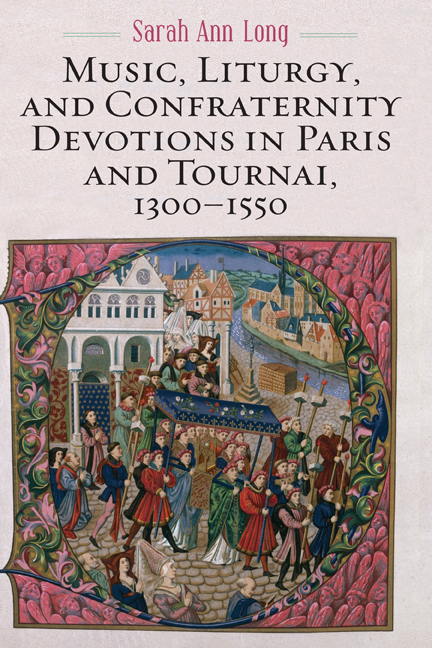Book contents
- Frontmatter
- Dedication
- Contents
- List of Illustrations
- Acknowledgments
- List of Abbreviations
- Editorial Procedures for Foreign Languages and Music Examples
- Note on Online Material
- Introduction
- 1 Confraternities and Popular Devotions to St. Barbara in Tournai
- 2 Relic Translation and Healing in Liturgies for St. Catherine and St. Nicholas in Paris
- 3 Historical Narratives and the Importance of Place in Masses for St. Sebastian
- 4 Compositional Practice, Networks, and the Dissemination of the Mass Ordinary in Confraternity Sources
- 5 The Role of the Parisian Book Production Community in the Perpetuation of Popular Devotions
- Conclusion
- Appendix 1 Sources
- Appendix 2 Inventories of Sources from Tournai
- Appendix 3 Scribal Hands and Gatherings in the Tournai Notary Confraternity Manuscripts
- Notes
- Bibliography
- Index of Chant and Polyphonic Compositions
- Index of Early Printed Liturgical Books
- Index of Manuscripts
- General Index
5 - The Role of the Parisian Book Production Community in the Perpetuation of Popular Devotions
Published online by Cambridge University Press: 23 June 2021
- Frontmatter
- Dedication
- Contents
- List of Illustrations
- Acknowledgments
- List of Abbreviations
- Editorial Procedures for Foreign Languages and Music Examples
- Note on Online Material
- Introduction
- 1 Confraternities and Popular Devotions to St. Barbara in Tournai
- 2 Relic Translation and Healing in Liturgies for St. Catherine and St. Nicholas in Paris
- 3 Historical Narratives and the Importance of Place in Masses for St. Sebastian
- 4 Compositional Practice, Networks, and the Dissemination of the Mass Ordinary in Confraternity Sources
- 5 The Role of the Parisian Book Production Community in the Perpetuation of Popular Devotions
- Conclusion
- Appendix 1 Sources
- Appendix 2 Inventories of Sources from Tournai
- Appendix 3 Scribal Hands and Gatherings in the Tournai Notary Confraternity Manuscripts
- Notes
- Bibliography
- Index of Chant and Polyphonic Compositions
- Index of Early Printed Liturgical Books
- Index of Manuscripts
- General Index
Summary
O Catherine, glorious among virgins, resplendent with laurel: pour out your prayers to the Lord for us, bride of Christ, for whose law you fell by the sword as martyr into the hand of the gentiles.
The text above is an alleluia verse for St. Catherine of Alexandria, which appears in a series of small sixteenth-century printed graduals entitled Misse familiares. It refers to St. Catherine's martyrdom and her ability to intercede on behalf of her supplicants, themes that we have seen in confraternity rituals throughout this book. St. Catherine continued to thrive in popular devotional consciousness well into the sixteenth century; in the various editions of the Misse familiares, she appears paired with St. Nicholas, showing the continuing relationship that the two saints had to each other. Their connection was widely recognized in Western Europe and is neatly summed up by William Caxton in his 1483 edition of the Golden Legend translated into English, where he refers to St. Catherine's virtues and her relationship to other saints:
… she was marvellous in privilege of dignity, for certain special privileges were in some saints when they died, like as the visitation of Jesu Christ was in St. John the Evangelist, the flowing of oil in St. Nicholas, the effusion of milk for blood that was in St. Paul, the preparation of the sepulchre in St. Clement, the hearing and granting of petitions in St. Margaret when she prayed for them remembering her memory. All these things together were in this blessed virgin S. Katherine as it appeareth in her legend.
The advertisements on the title and colophon pages of the Misse familiares imply that they were produced for a very broad market, which likely included Parisian trade and devotional confraternities, students at the University of Paris, and other types of religious settings. This series of printed graduals, which contain five widespread votive masses and a full kyriale, were produced in Paris during the early decades of the sixteenth century, first by Geoffrey Marnef and later by François Regnault. They were associated with a number of other small liturgical books entitled Misse solenniores (which contain a dozen Mass ordinaries for major feast days), Communes prose (which contain fifteen popular sequences), and Passiones novissime (passions according to Matthew and John).
- Type
- Chapter
- Information
- Publisher: Boydell & BrewerPrint publication year: 2021



